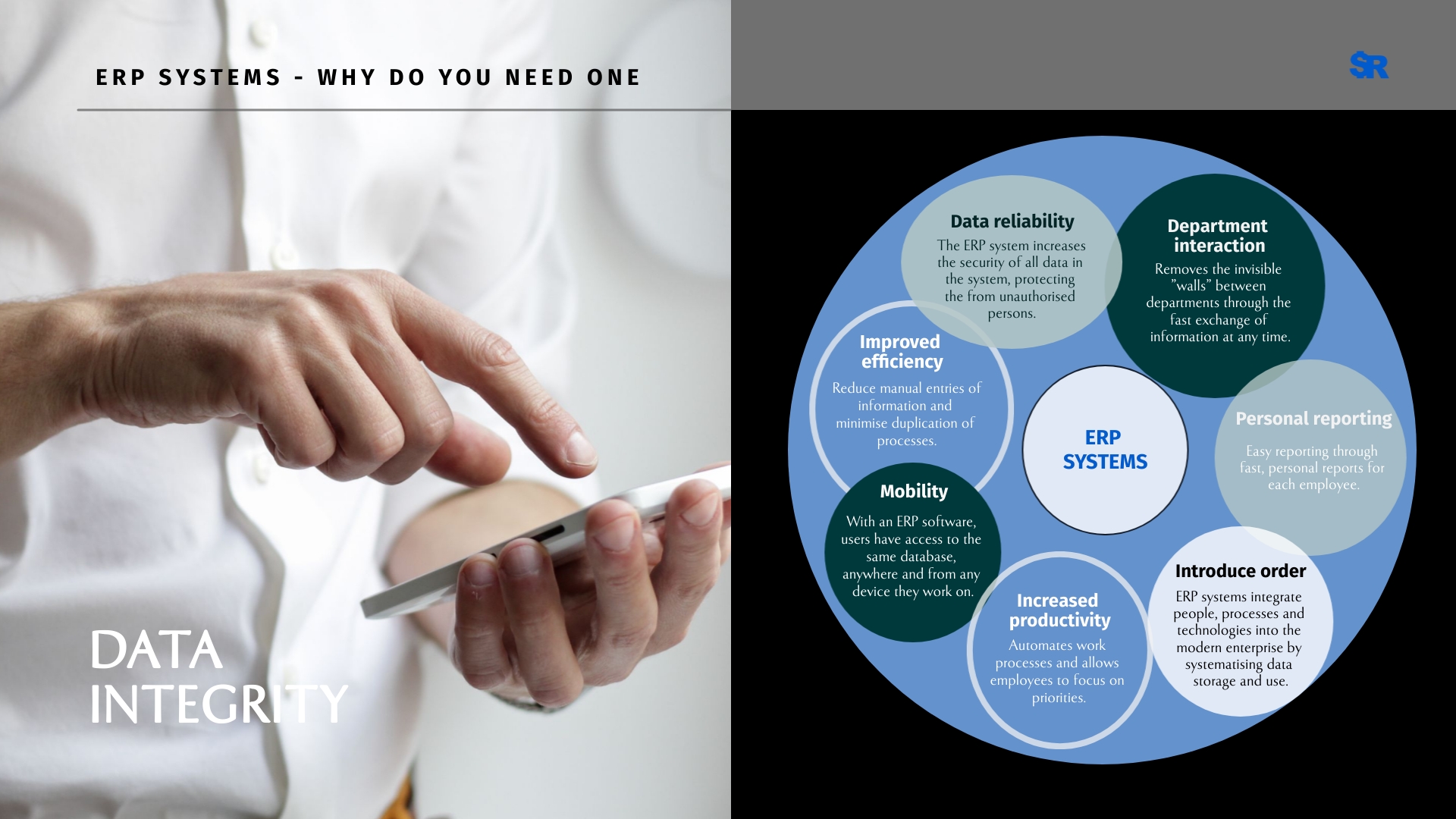
'ERP' or the Enterprise Resource Planning software is designed to bring order to a chaotic environment, to give you real-time clarity on all aspects of your business, and to help you plan more easily and efficiently in the future. Enterprise Resource Planning (ERP) systems are at the core of efficient business operations, helping organizations integrate and automate essential functions, from finance and supply chain to human resources and inventory management. With a seamless ERP system, businesses can streamline their processes, gain real-time insights, and make data-driven decisions that drive growth.
ERP systems are used in all the processes necessary for the operation of a company - personnel and customer management, finance, production, availability of materials or products, delivery systems, services, orders and much more. In short, ERP combines all these processes and activities into one system, giving you a clear picture in real time.
Improved productivity, increased efficiency, optimized costs and streamlined processes are just some of the key benefits of an ERP system. Enterprise resource planning (ERP) is a type of software that organizations use to manage their day-to-day activities, such as sales, procurement, and all other operations. Our ERP package also includes Business Intelligence (BI) software that helps you plan, forecast, and report your organization's financial results.
ERP systems are used to connect several business processes and allow the exchange of data between them - for this purpose they collect shared data of the organization from several sources. ERP systems eliminate duplication of information and provide a complete business image across a single platform.
ERP systems are designed around a single platform, which has a common database and interface. This helps to ensure that the information used in the enterprise is channeled and based on uniform definitions and requirements. The main purpose of an ERP is to integrate people, processes and technologies into the modern enterprise.
To illustrate the capability of the ERP system, we will take as example a car manufacturing company because it requires the purchase of parts and components from several suppliers. The ERP system would facilitate the process of tracking stocks and purchasing the necessary materials and components, and ensure that the same correct data is used at every stage of the process - from order to payment. The same principle applies to reporting and analysis. If an ERP system is implemented correctly in the respective company, the "brake pads" component, for example, will be identified in the ERP system simultaneously with: part name, size, material, source, batch number, supplier number, serial number, price and other specifications, without duplication and without appearing elsewhere under different names. This process works in tandem with many other descriptive and data-based elements, shortening the process of manually entering and duplicating information.
A basic principle of the ERP system is the centralized data collection for a wide distribution. Instead of several independent databases with an endless inventory of disjoint spreadsheets, ERP systems put order into these processes. Thus, all users - from CEO to store employees - can create, store and use the same data, the system being specially designed to ensure that the information is accurate and complete.
Today, ERP systems are essential for the management of thousands of companies of all sizes and in all industries. These companies use ERP systems as an indispensable infrastructure for running their business.
Slave to business or lost in data?
If you feel more and more often that the overall image of your business is being lost due to the analysis of details that require too much time and resources, it may be time to consider implementing an ERP system. Be honest and see if the following descriptions apply to you and your organization.
- You spend more and more time with daily tasks - sometimes using too many different applications can cause delays in managing key tasks. ERP software integrates solutions and data into a single system with a common interface, which facilitates business unit communication and efficient work.
- You have many unanswered questions about your business - can you easily answer important questions about your business such as: what is the revenue from the production line or profitability? If not, it means that detached systems and lack of access to essential parameters are slowing you down. This also slows down your analysis and decision-making.
- You have unclear business processes - it can be difficult to manage inventory, satisfy customers, or keep costs under control. If you find yourself in this situation, it means that your processes need to be restructured in order to grow your business or change your priorities.
- You have intensive, manual data-entry processes - do most of your departments use their own applications and processes to do their job? In this case, you may be wasting too much time and resources on duplicate data. When information cannot flow easily between systems, reporting takes longer, errors are more frequent, and decision-making is more difficult.
- You lack the ability to act quickly - you spend so much time running your business that you can't look for new opportunities? New ERP systems include advanced and intelligent capabilities, such as machine learning and predictive analytics that make it easier to identify new and potentially profitable businesses.
Implementing the ERP software is a fundamental solution and should be well thought out. This is a prerequisite especially if you are implementing a complete software solution for the first time. If you want to see a positive change in your business and achieve overall growth, it's important to take the necessary steps to see the benefits. You need to keep in mind that the implementation process is time consuming and, in addition to financial investment, it requires patience, perseverance and constant motivation.

